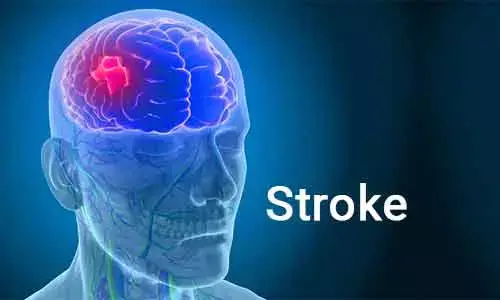- Home
- Medical news & Guidelines
- Anesthesiology
- Cardiology and CTVS
- Critical Care
- Dentistry
- Dermatology
- Diabetes and Endocrinology
- ENT
- Gastroenterology
- Medicine
- Nephrology
- Neurology
- Obstretics-Gynaecology
- Oncology
- Ophthalmology
- Orthopaedics
- Pediatrics-Neonatology
- Psychiatry
- Pulmonology
- Radiology
- Surgery
- Urology
- Laboratory Medicine
- Diet
- Nursing
- Paramedical
- Physiotherapy
- Health news
- Fact Check
- Bone Health Fact Check
- Brain Health Fact Check
- Cancer Related Fact Check
- Child Care Fact Check
- Dental and oral health fact check
- Diabetes and metabolic health fact check
- Diet and Nutrition Fact Check
- Eye and ENT Care Fact Check
- Fitness fact check
- Gut health fact check
- Heart health fact check
- Kidney health fact check
- Medical education fact check
- Men's health fact check
- Respiratory fact check
- Skin and hair care fact check
- Vaccine and Immunization fact check
- Women's health fact check
- AYUSH
- State News
- Andaman and Nicobar Islands
- Andhra Pradesh
- Arunachal Pradesh
- Assam
- Bihar
- Chandigarh
- Chattisgarh
- Dadra and Nagar Haveli
- Daman and Diu
- Delhi
- Goa
- Gujarat
- Haryana
- Himachal Pradesh
- Jammu & Kashmir
- Jharkhand
- Karnataka
- Kerala
- Ladakh
- Lakshadweep
- Madhya Pradesh
- Maharashtra
- Manipur
- Meghalaya
- Mizoram
- Nagaland
- Odisha
- Puducherry
- Punjab
- Rajasthan
- Sikkim
- Tamil Nadu
- Telangana
- Tripura
- Uttar Pradesh
- Uttrakhand
- West Bengal
- Medical Education
- Industry
Mobile units speed up stroke care, reduce disability risk: Study

USA: Mobile stroke units (MSUs) improves patients outcomes and reduce the risk of disability by delivering care faster than standard stroke care, finds a recent study.
MSUs are state-of-the-art ambulances built to provide stroke patients with emergency neurological diagnosis and treatment prior to hospital arrival. It carries a CT scanner that can directly image the brain and blood vessels in the field.
According to the study, for every 100 patients treated with a mobile stroke unit rather than standard care later in the emergency department, 27 will have less final disability, including 11 more who will be disability free.
The findings of the study were presented at the International Stroke Conference 2021.
Dr. May Nour, the UCLA MSU program's medical director and a lead author on the study, said that she is very pleased that the study findings reflect the positive experience that she and her colleagues have been witnessing while treating patients in the field.
"Stroke is one of the golden-hour emergencies in which the swift timing of conclusive diagnosis and treatment dramatically impacts patient outcome and their chances of meaningful recovery," Dr. Nour said. "We set out a few years ago to quantify the magnitude of benefit of mobile stroke unit pre-hospital care for our patients."
The study compared tissue plasminogen activator (tPA)-eligible patients managed by MSUs vs standard ambulance/emergency room care. It enrolled 1,517 patients with suspected acute ischemic stroke within 4.5 hours of experiencing symptoms. This included 617 patients in the MSU group and 430 in the standard care group who qualified for tPA. Of the tPA eligible patients, 97% received it in the MSU versus 80% with standard care.
Time from onset of symptoms until tPA treatment was shorter in the MSU group with a median time of 72 minutes versus 108 minutes in the standard treatment group. Thirty-three percent of MSU patients were treated within 60 minutes, compared to just 3% of SM patients.
The research concluded that the MSU patients had better outcomes and experienced much less disability, likely because the MSU patients received treatment faster.
"This convincing demonstration of the benefits of MSU care will support the incorporation of mobile stroke units into emergency medical systems throughout the country," said Jeffrey Saver, MD, the director of the UCLA Comprehensive Stroke and Vascular Neurology Program. He added, "A new era in acute stroke has arrived."
Research from UCLA has shown that 2 million brain cells are injured every minute in a stroke, supporting the American Heart/Stroke Association's public message that, "Time lost is brain lost in acute stroke,'' Dr. Saver said.
"The study results demonstrate that for every 100 patients treated with a mobile stroke unit rather than standard care later in the emergency department, 27 will have less final disability, including 11 more who will be disability free," Dr. Nour added. "With these results, and keeping our patients and their families in the forefront of our minds, we are hopeful that this data provides initiative for expanding the mobile stroke unit pilot in our county to include a fleet of MSUs to serve all of the citizens of Los Angeles County in their greatest time of need."
Dr Kamal Kant Kohli-MBBS, DTCD- a chest specialist with more than 30 years of practice and a flair for writing clinical articles, Dr Kamal Kant Kohli joined Medical Dialogues as a Chief Editor of Medical News. Besides writing articles, as an editor, he proofreads and verifies all the medical content published on Medical Dialogues including those coming from journals, studies,medical conferences,guidelines etc. Email: drkohli@medicaldialogues.in. Contact no. 011-43720751


